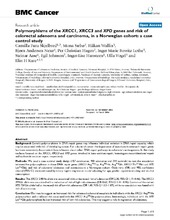| dc.contributor.author | Skjelbred, Camilla Furu | en_US |
| dc.contributor.author | Sæbø, Mona | en_US |
| dc.contributor.author | Wallin, Håkan | en_US |
| dc.contributor.author | Nexø, Bjørn Andersen | en_US |
| dc.contributor.author | Hagen, Per Christian | en_US |
| dc.contributor.author | Lothe, Inger Marie Bowitz | en_US |
| dc.contributor.author | Aase, Steinar | en_US |
| dc.contributor.author | Johnson, Egil | en_US |
| dc.contributor.author | Hansteen, Inger-Lise | en_US |
| dc.contributor.author | Vogel, Ulla | en_US |
| dc.contributor.author | Kure, Elin H. | en_US |
| dc.date.accessioned | 2006-10-27T15:18:12Z | |
| dc.date.available | 2006-10-27T15:18:12Z | |
| dc.date.issued | 2006-03-16 | eng |
| dc.identifier.issn | 1471-2407 | |
| dc.identifier.uri | https://hdl.handle.net/1956/1926 | |
| dc.description.abstract | Background: Genetic polymorphisms in DNA repair genes may influence individual variation in DNA repair capacity, which may be associated with risk of developing cancer. For colorectal cancer the importance of mutations in mismatch repair genes has been extensively documented. Less is known about other DNA repair pathways in colorectal carcinogenesis. In this study we have focused on the XRCC1, XRCC3 and XPD genes, involved in base excision repair, homologous recombinational repair and nucleotide excision repair, respectively. Methods: We used a case-control study design (157 carcinomas, 983 adenomas and 399 controls) to test the association between five polymorphisms in these DNA repair genes (XRCC1 Arg194Trp, Arg280His, Arg399Gln, XRCC3 Thr241Met and XPD Lys751Gln), and risk of colorectal adenomas and carcinomas in a Norwegian cohort. Odds ratio (OR) and 95% confidence interval (95% CI) were estimated by binary logistic regression model adjusting for age, gender, cigarette smoking and alcohol consumption. Results: The XRCC1 280His allele was associated with an increased risk of adenomas (OR 2.30, 95% CI 1.19–4.46). The XRCC1 399Gln allele was associated with a reduction of risk of high-risk adenomas (OR 0.62, 95% CI 0.41–0.96). Carriers of the variant XPD 751Gln allele had an increased risk of low-risk adenomas (OR 1.40, 95% CI 1.03–1.89), while no association was found with risk of carcinomas. Conclusion: Our results suggest an increased risk for advanced colorectal neoplasia in individuals with the XRCC1 Arg280His polymorphism and a reduced risk associated with the XRCC1 Arg399Gln polymorphism. Interestingly, individuals with the XPD Lys751Gln polymorphism had an increased risk of low-risk adenomas. This may suggest a role in regression of adenomas. | en_US |
| dc.format.extent | 307528 bytes | eng |
| dc.format.mimetype | application/pdf | eng |
| dc.language.iso | eng | eng |
| dc.publisher | BioMed Central | eng |
| dc.rights | Attribution CC BY | eng |
| dc.rights.uri | http://creativecommons.org/licenses/by/2.0 | eng |
| dc.title | Polymorphisms of the XRCC1, XRCC3 and XPD genes and risk of colorectal adenoma and carcinoma, in a Norwegian cohort : a case control study | en_US |
| dc.type | Peer reviewed | |
| dc.type | Journal article | |
| dc.description.version | publishedVersion | en_US |
| dc.source.articlenumber | 67 | |
| dc.identifier.doi | https://doi.org/10.1186/1471-2407-6-67 | |
| dc.identifier.cristin | 396472 | |
| dc.source.journal | BMC Cancer | |
| dc.source.40 | 6 | |
| dc.subject.nsi | VDP::Medisinske Fag: 700::Basale medisinske, odontologiske og veterinærmedisinske fag: 710::Medisinsk genetikk: 714 | nob |
| dc.subject.nsi | VDP::Medisinske Fag: 700::Basale medisinske, odontologiske og veterinærmedisinske fag: 710 | nob |

